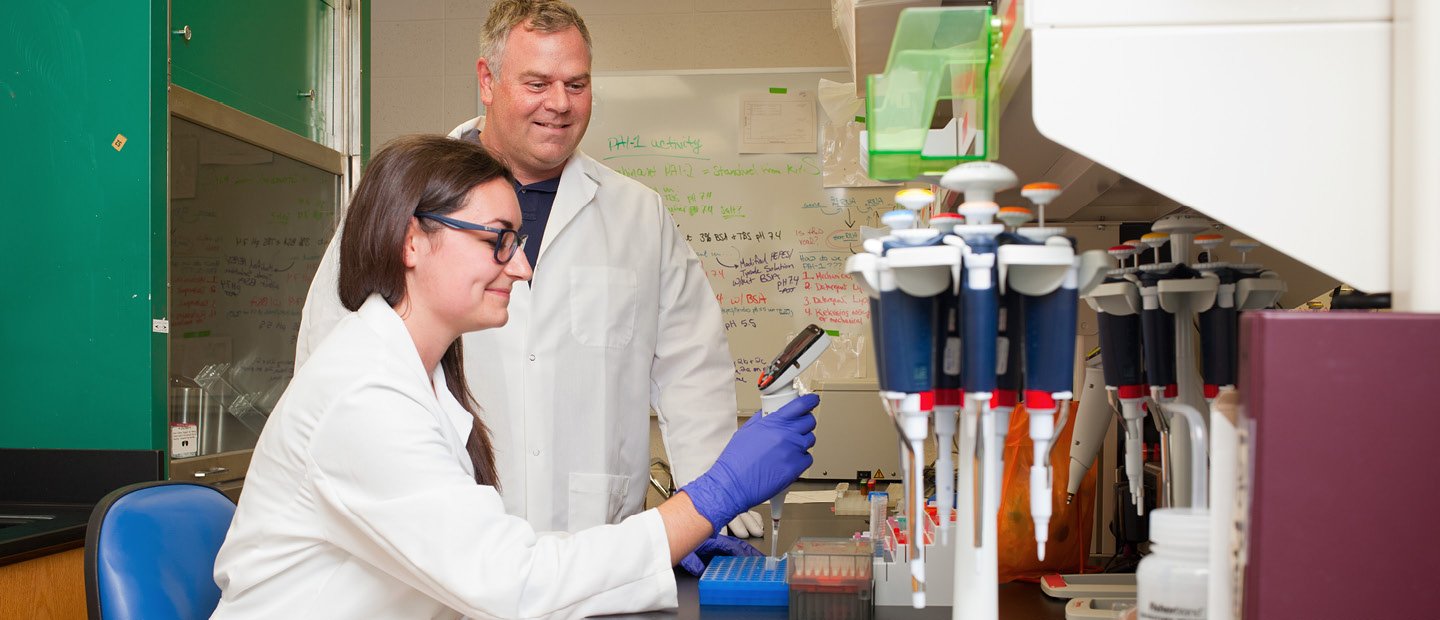
Research
The department, with research labs mainly in Dodge Hall and the Mathematics and Science Center, is engaged in a variety of research projects, including aquatic and vertebrate ecology, biochemistry, cell physiology, cellular aging, evolution, gene regulation, immunology, microbiology, molecular biology, genetics, parasitology, climate change biology and stem cell research. Many biology majors elect to participate in the research programs of individual faculty members for which they receive course credit (BIO 4995). The student must initiate the process by talking to faculty members about their programs. A list of faculty and a brief description of their research interests can be accessed on the tabs below.
Available facilities include a largely natural 1,500 acre campus (110 acres designated as a biological preserve), confocal microscopy laboratories, flow cytometry, darkroom and isotope laboratories, a herbarium collection, animal care facilities, cold rooms and a tissue culture suite with facilities for working with biohazardous materials. For an inventory of available equipment, visit the Center for Biomedical Research website.
Rhee, Sang: Mucosal immunology; Molecular and biochemical aspects of immune regulation underlying the diseases and the development of preventive and therapeutic approaches in humans.
Song, Mi Hye: Molecular and genetic mechanisms of centrosome assembly and regulation.
Washington, A. Valance: Platelet-immune interface and understanding how the immune system gains access to the hemostatic mechanisms.
Oleksyk, Taras: Genome diversity and its implications to evolutionary processes of adaptation and speciation.
Figueiredo, Vandré C.: Cellular and molecular mechanisms of skeletal muscle mass determination, regulation of ribosome biogenesis and turnover, cell growth signaling.
Govind, Chhabi: Eukaryotic transcription; recruitment and functional analysis of histone modifying and chromatin remodeling complexes.
Song, Mi Hye: Molecular and genetic mechanisms of centrosome assembly and regulation.
Villa-Diaz, Luis: Interconnection between human pluripotent stem cells and the extracellular microenvironment with special emphasis on their effect on self-renewal and specific cell lineage differentiation.
Blumer-Schuette, Sara: Microbial physiology and genomics relating to life in extreme environments.
Figueiredo, Vandré C.: Cellular and molecular mechanisms of skeletal muscle mass determination, regulation of ribosome biogenesis and turnover, cell growth signaling.
Wagner, Nicole: How abiotic and biotic stress affects the eco-physiology and life-history traits of plankton; Biogeochemical cycling in lakes.
Westrick, Randal: Genetics of cardiovascular disease.
Berven, Keith: Amphibian population biology and evolution of life history patterns.
Oleksyk, Taras: Genome diversity and its implications to evolutionary processes of adaptation and speciation.
Raffel, Thomas: Ecology and evolution of host/parasite interactions.
Tiegs, Scott: Stream and river ecology; river restoration; resource subsidies; organic matter decomposition; human impacts to riverine ecosystems; stream-watershed interactions; roles of species in ecosystems.
Wagner, Nicole: How abiotic and biotic stress affects the eco-physiology and life-history traits of plankton; Biogeochemical cycling in lakes.
Liu, Zijuan: Molecular mechanisms of metalloid transport in prokaryotes and eukaryotes.
Rhee, Sang: Mucosal immunology; the effects of host-gut microbial interaction on immune system regulation associated with inflammatory diseases and cancer.
Department of Biological Sciences
118 Library Dr
Rochester, MI 48309-4479
(location map)
(248) 370-3550
fax: (248) 370-4225
[email protected]

